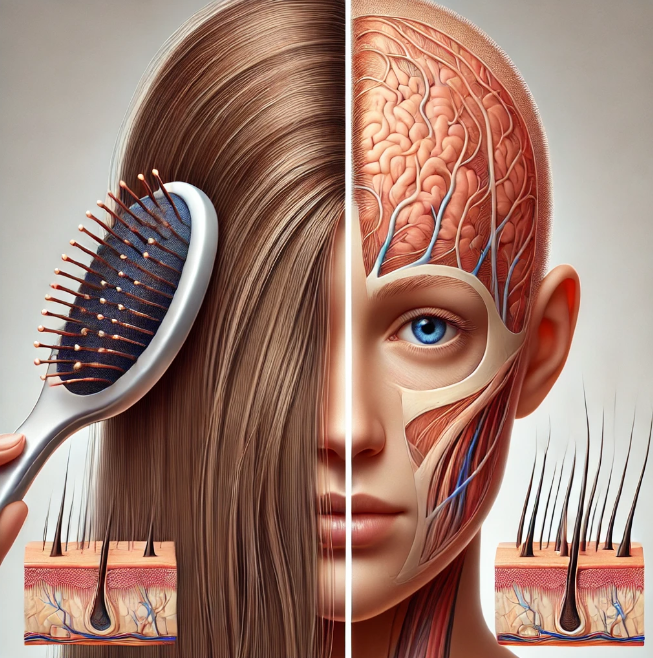
On average, every woman loses between 50 and 100 hairs per day. So, losing some hair every day is normal, although it may seem alarming. But if you are constantly losing a large amount of hair, this may require you to think deeper about the reasons for this. Hair loss has different meanings and requires different treatments.
Natural hair loss vs pathological hair loss
According to dermatologist Dr. Mohamed Hussein from Cairo, natural hair loss occurs in a condition known as telogen effluvium, where the normal rate of hair loss ranges from 50 to 100 hairs per day. If you notice some hairs falling out while washing your hair or brushing it, there is no need to worry. However, if hair loss increases significantly, it may be a sign of excessive hair loss due to several factors, including physical or psychological stress, especially after 6 to 12 weeks of a traumatic event or stressful period.
Factors that lead to excessive hair loss
There are several factors that can lead to hair loss more than usual, including:
Psychological stress
Divorce
Weight loss
Iron deficiency
General illness
Change of job
Pregnancy or childbirth
Death of a family member
Hormonal contraceptives
Changes in diet
Emotional shocks
Seasonal changes, especially from summer to fall
It is important to monitor the amount of hair you are losing and identify possible factors. You can ask yourself questions such as: Have you been pulling your hair? Do you wash it too often?
Pathological hair loss
There are several types of hair loss, and it is difficult to pinpoint the exact cause of hair loss, due to the many types and contributing factors. Here are some common types:
Androgenic alopecia: This occurs as a result of an over-response to androgens, and about 50% of men and women may suffer from it.
Alopecia areata: This causes hair loss in patches, usually on the top of the head. It can be linked to genetic factors.
Traction alopecia: This is caused by tight hairstyles, such as ponytails or braids, which leads to hair loss over time.
Other causes of hair loss
In addition to the types mentioned, there are several common causes that contribute to hair loss, including:
Aging
Pregnancy
Illness
Genetic factors
Scalp infections
Scalp psoriasis
Autoimmune complications
Chemotherapy
Tight hairstyles
Biotin deficiency
Sexually transmitted infections
Poor hair care, such as excessive perming or coloring
Hormonal imbalance, especially after menopause
How to Reduce Hair Loss If you are suffering from hair loss, you can take some steps to treat the problem:
Scalp Care: Take care of your scalp like your face, using weekly scrubs and moisturizers. You can also add a nourishing serum to your routine.
Scalp Massage: Studies have shown that scalp massage improves hair health.
Take supplements: Make sure you are getting enough biotin and other supplements that are good for hair health.
Reducing stress: Try to reduce stress in your life, which will help reduce hair loss.
Visit a specialist: If you are unsure about the cause of your hair loss, it is best to consult a dermatologist or hair specialist to determine the root cause and provide appropriate treatment.
It is normal to lose some hair every day, but if you are experiencing severe hair loss, it may be a sign of a problem that needs attention. It is important to consult a specialist to provide an accurate assessment and appropriate treatment, as taking good care of your scalp is an important step in maintaining healthy hair.







